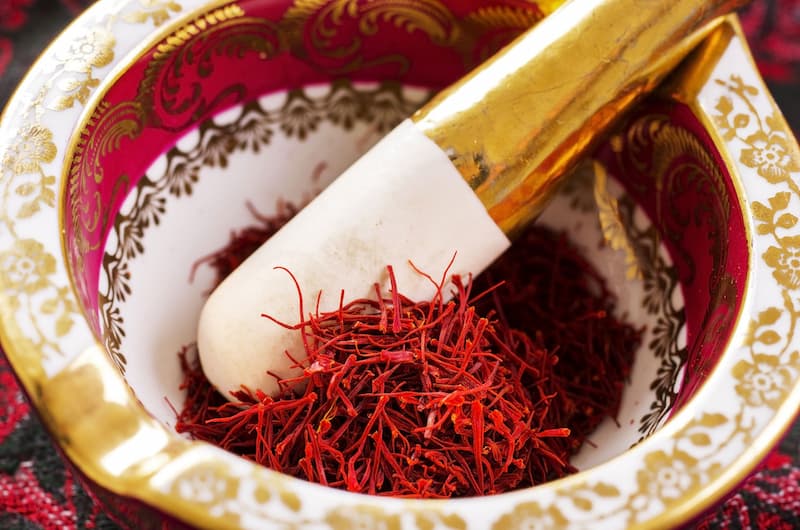While saffron is primarily renowned for its culinary uses, there is some research suggesting that it may have potential benefits for sleep. It’s important to note that the scientific evidence is still in its early stages, and more research is needed to establish conclusive links between saffron and improved sleep. However, some studies and traditional practices hint at the potential sleep-enhancing properties of saffron.
- Mood Regulation:
Saffron has been traditionally used in various cultures for its mood-enhancing properties. Improved mood and reduced anxiety or stress levels may contribute to better sleep. Chronic stress and anxiety are known contributors to sleep disturbances, and saffron’s potential mood-regulating effects could indirectly support a more restful sleep.
- Anti-Depressant Properties:
Some studies have explored saffron’s potential as an antidepressant. Since depression and sleep disorders often go hand in hand, the mood-lifting effects of saffron might indirectly contribute to better sleep quality. However, it’s essential to consult a healthcare professional for advice on using saffron as a supplement for mental health concerns.
- Melatonin Production:
Melatonin is a hormone that regulates the sleep-wake cycle. While there is limited direct evidence on saffron’s impact on melatonin production, some studies suggest that saffron may influence the expression of genes related to melatonin synthesis. This could potentially contribute to a more regular sleep pattern.
4.Antioxidant Properties:
Saffron is rich in antioxidants, which play a role in reducing oxidative stress in the body. Oxidative stress has been linked to various health issues, including sleep disturbances. By combating oxidative stress, saffron may indirectly contribute to better overall health and improved sleep.
5.Anti-Inflammatory Effects:
Chronic inflammation is associated with various health problems, including sleep disorders. Saffron has demonstrated anti-inflammatory properties in some studies, and reducing inflammation could positively impact sleep quality.
It’s important to approach the potential sleep benefits of saffron with caution:
– Dosage and Form:
The appropriate dosage and form (powder, extract, supplement) of saffron for sleep improvement are not yet well-established. Too much saffron can be harmful, so it’s crucial to follow recommended guidelines.
– Individual Variability:
Responses to saffron can vary among individuals. What works for one person may not have the same effects for another.
– Consultation with a Healthcare Professional:
Before incorporating saffron supplements into your routine, it’s advisable to consult with a healthcare professional. They can provide personalized advice based on your health history, existing medications, and individual needs.
While the potential sleep benefits of saffron are intriguing, more research is needed to fully understand its mechanisms and establish concrete recommendations. As with any supplement or dietary change, it’s crucial to prioritize a balanced lifestyle, including proper sleep hygiene practices, regular exercise, and a well-balanced diet.
Golden Slumbers: Unveiling the Sleep-Enhancing Potential of Saffron
In the realm of wellness, the pursuit of quality sleep remains a paramount concern for many. While saffron has long been celebrated for its culinary contributions, emerging research suggests that its benefits may extend beyond the kitchen. This essay delves into the intriguing world of saffron and its potential to enhance sleep, exploring the science behind this golden spice’s impact on our nightly repose.
Saffron has a storied history of use in traditional medicine for its mood-enhancing properties. A positive mood and reduced stress levels often contribute to a more peaceful state of mind conducive to restful sleep. The bioactive compounds found in saffron, including crocin and safranal, have been studied for their potential to modulate neurotransmitters associated with mood, such as serotonin. A balanced and calm mood may set the stage for golden slumbers.
The sleep-wake cycle is intricately regulated by the hormone melatonin. Recent studies have hinted at saffron’s potential influence on melatonin production. While more research is needed to establish a direct link, the preliminary findings suggest that saffron may play a role in supporting the body’s natural circadian rhythm. This, in turn, could contribute to more consistent and restorative sleep patterns.
Anxiety and stress are common culprits behind disrupted sleep. Saffron’s traditional use as a stress-relieving agent has prompted scientific exploration into its potential anti-anxiety effects. By reducing anxiety levels, saffron may indirectly promote better sleep quality. The calming influence of saffron on the nervous system could translate into a more tranquil transition into the realm of dreams.
Saffron is renowned for its rich antioxidant content, which plays a crucial role in combating oxidative stress in the body. Oxidative stress has been implicated in various health issues, including sleep disturbances. By acting as an antioxidant powerhouse, saffron may contribute to the overall well-being of the body, creating an environment conducive to rejuvenating sleep.
Chronic inflammation has been linked to a myriad of health problems, including sleep disorders. Saffron’s anti-inflammatory properties, as indicated by some research, may play a role in mitigating inflammation. The potential reduction in inflammatory markers could contribute to an improved sleep environment, fostering a more restful and undisturbed night’s sleep.
While the sleep-enhancing potential of saffron is an intriguing subject, it’s crucial to approach the findings with cautious optimism. Research in this area is still in its early stages, and more comprehensive studies are needed to establish concrete recommendations. As with any supplement or lifestyle adjustment, it’s advisable to consult with a healthcare professional before incorporating saffron into your sleep routine.
In the realm of wellness, saffron’s golden threads weave a story of potential benefits for our sleep. Whether through mood regulation, melatonin influence, anti-anxiety properties, antioxidant defense, or inflammation reduction, saffron holds promise as a multifaceted ally in the pursuit of golden slumbers. As science continues to unravel the secrets behind saffron’s impact on sleep, we find ourselves in an exciting era where ancient wisdom meets modern understanding, offering new avenues for enhancing the quality of our nightly rest.
Soothing Threads: The Connection Between Saffron and Restful Sleep
In the world of wellness, the quest for a good night’s sleep is a universal pursuit. Amidst the diverse array of remedies, saffron emerges as a unique contender, celebrated not only for its culinary allure but also for its potential to foster restful sleep. This essay explores the soothing threads that connect saffron to the realm of restful slumber, unraveling the intriguing relationship between this golden spice and the pursuit of peaceful nights.
Saffron’s aromatic profile extends beyond its culinary applications, reaching into the realm of sensory tranquility. The delicate, floral fragrance released by saffron’s threads has been traditionally associated with a calming effect on the mind. Inhaling this natural essence before bedtime may set the stage for relaxation, signaling the body to unwind and prepare for a serene night’s sleep.
Saffron has earned its place in traditional medicine for its mood-enhancing properties. The bioactive compounds within saffron, including crocin and safranal, have been investigated for their potential impact on neurotransmitters related to mood, such as serotonin. Elevating one’s mood can create a positive mental environment, reducing stress and anxiety that may interfere with the quality of sleep. Saffron’s subtle influence on mood may contribute to a more restful and rejuvenating sleep experience.
At the heart of saffron’s potential sleep benefits lies its interaction with melatonin, the hormone responsible for regulating the sleep-wake cycle. While research is ongoing, some studies suggest that saffron may modulate the expression of genes related to melatonin synthesis. This intriguing connection hints at saffron’s role in promoting a natural circadian rhythm, potentially leading to more consistent and refreshing sleep patterns.
Anxiety and stress often act as formidable barriers to a peaceful night’s sleep. Saffron, with its historical use as a stress-reliever, may contribute to a reduction in anxiety levels. By soothing the nervous system and alleviating tension, saffron creates an environment conducive to relaxation and tranquility, paving the way for a restful descent into the world of dreams.
Saffron’s rich antioxidant content adds another layer to its potential sleep-enhancing properties. Antioxidants play a crucial role in neutralizing oxidative stress, a factor linked to various health issues, including sleep disturbances. By providing the body with antioxidant support, saffron may contribute to overall well-being, fostering an environment conducive to restorative nights of sleep.
In the enchanting tapestry of wellness, saffron’s soothing threads weave a story of potential benefits for restful sleep. Whether through its aromatic allure, mood-elevating properties, melatonin connection, anxiety-relieving effects, or antioxidant armor, saffron emerges as a multifaceted ally in the pursuit of peaceful nights. While scientific exploration into the connection between saffron and sleep continues, the age-old wisdom surrounding this golden spice invites us to consider the potential tranquility it may bring to our nightly rituals. As we navigate the realms of wellness, saffron stands as a gentle guide, inviting us to explore the soothing threads that connect it to the sacred space of restful slumber.
Sweet Dreams Infused with Gold: Exploring How Saffron May Improve Your Sleep
As the pursuit of quality sleep becomes an essential aspect of well-being, individuals are exploring unconventional avenues to enhance their nightly repose. In this quest, saffron, with its golden hues and rich cultural heritage, emerges as a fascinating contender. This essay delves into the enchanting world of saffron, unraveling the potential ways in which this spice, often referred to as “red gold,” may contribute to sweet dreams and improved sleep.
Saffron, renowned for its culinary contributions, boasts a history rooted in ancient traditions. Beyond its culinary prowess, saffron has piqued interest for its potential to influence sleep. Rich in bioactive compounds, including crocin and safranal, saffron presents a complex profile that extends beyond flavor, hinting at a multifaceted connection to sleep enhancement.
The aromatic allure of saffron extends beyond the kitchen, carrying subtle notes of tranquility. Inhaling the delicate fragrance of saffron before bedtime may act as a sensory prelude to relaxation. The calming aroma has been traditionally associated with stress reduction, setting the stage for a peaceful transition from wakefulness to the embrace of sweet dreams.
Saffron’s influence on neurotransmitters, including serotonin, has prompted investigations into its potential mood-modulating effects. A positive mood and reduced stress levels are integral to achieving restful sleep. By fostering a serene mental environment, saffron may indirectly contribute to improved sleep quality, inviting individuals into a night of sweet dreams.
Central to the intricacies of sleep is the hormone melatonin, which regulates the sleep-wake cycle. While research is ongoing, preliminary studies suggest that saffron may play a role in melatonin regulation. This connection hints at saffron’s potential to support the body’s circadian rhythm, promoting a more natural and balanced sleep pattern.
Anxiety often acts as a nocturnal disruptor, hindering the ability to achieve deep and restorative sleep. Saffron’s historical use as an anxiety-relieving agent invites exploration into its potential to alleviate the weight of nighttime stressors. By soothing the nervous system, saffron may create an environment conducive to tranquil and undisturbed nights.
Saffron’s rich antioxidant content contributes to its potential sleep-enhancing properties. Oxidative stress, linked to various health issues, including sleep disturbances, may be mitigated by saffron’s antioxidant prowess. By providing cellular protection, saffron nurtures an internal environment that supports the body’s ability to unwind and regenerate during sleep.
In the symphony of spices, saffron emerges as a golden note, inviting us to explore its potential contributions to sweet dreams and improved sleep. Whether through its calming aroma, mood-modulating effects, melatonin regulation, anxiety alleviation, or antioxidant richness, saffron weaves a tale of multidimensional support for restful nights. While scientific inquiry into the specifics continues, the centuries-old wisdom surrounding saffron’s cultural significance beckons us to consider its potential role in infusing our dreams with the golden essence of peaceful slumber. As we navigate the realms of sleep enhancement, saffron stands as a gentle guide, offering the promise of sweet dreams infused with the magic of gold.








No comment